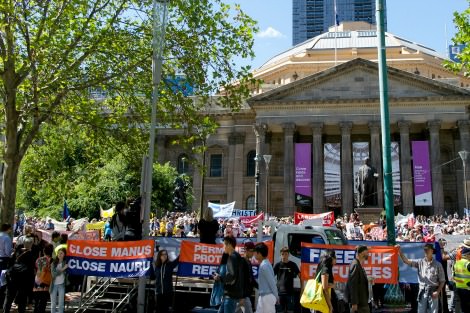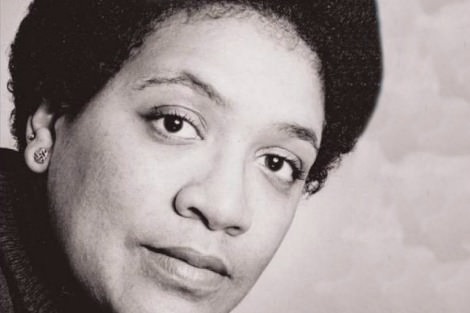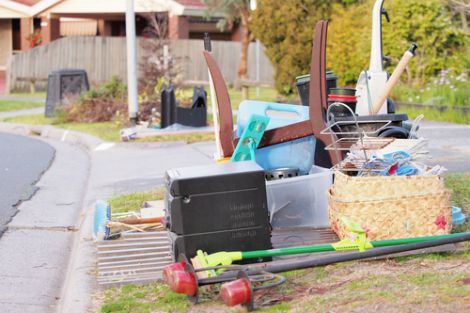Keywords: Ritual
There are more than 200 results, only the first 200 are displayed here.
-

RELIGION
- Andrew Hamilton
- 07 April 2016
19 Comments
How do good people sink to this? The answer lies in the mutation of economic ideology from the crude buccaneering spirit of doing whatever it takes to get rich into a more urbane form. People see themselves as competing, not only for their own economic benefit, but for that of the company. This means greed can mask itself as altruism in serving a larger good. And as in the case of churches, identification with the company provides reason for protecting the company's reputation at all costs.
READ MORE 
-

AUSTRALIA
- Andrew Hamilton
- 31 March 2016
5 Comments
The Palm Sunday Refugee Marches have come and gone; the travails of people who seek asylum continue. In a recent article that reflects her rich experience, Moira Rayner was right to say that marches are not effective in changing policy. Where they are, as in the Vietnam War marches in Australia or in Manila under Marcos, the fortress was already crumbling. Yet even when they are not effective, marches are not a waste of energy. Their value lies not in their effectiveness but in their ritual.
READ MORE 
-

ARTS AND CULTURE
- Tim Kroenert
- 03 March 2016
In the history of the Second World War and the deathly screed of the Final Solution, the Sonderkommando cuts a pitiable figure. These Jewish prisoners at Auschwitz and other death camps who were forced to perform the logistics surrounding mass murder - the carting and disposal of dead flesh - though patently victims, were viewed by some as collaborators. Son of Saul provides an immersive and impressionistic extrapolation of this ethical and actual horror.
READ MORE 
-

AUSTRALIA
- Somayra Ismailjee
- 24 February 2016
4 Comments
Feminist writer Audre Lorde wrote that 'Caring for myself is not self-indulgence, it is self-preservation, and that is an act of political warfare.' In medical professions, the term 'self-care' originated in reference to the self-management of illness. Self-care, however, also exists in the context of social justice, extending beyond physical wellness to cater for a holistic approach that includes emotional, mental and spiritual fulfilment. The need for this is rooted in the burden of oppression.
READ MORE 
-

AUSTRALIA
- Paul Coghlan
- 17 February 2016
6 Comments
Having worked at Victoria Police for 25 years, I have great empathy for Wade Noonan, who stepped down as Victoria's Minister for Police to undergo counselling due to his exposure to traumatic incidents in this work. I have long felt that job advertisements for police should carry a health warning: This position may be dangerous to your mental, physical and spiritual health. Whether it be trawling through crime statistics or investigating crimes directly, police work means filling your soul with dark things.
READ MORE 
-

ARTS AND CULTURE
- B. N. Oakman
- 10 November 2015
7 Comments
I'd never met a Vietnamese, couldn't figure what we had against them. But we were raised in shadow of returned men, the shimmer of lapelled bronze, a presumption we in our turn would go when ordered ... Most of us dodged gap years of sweat and khaki, missing madness, maiming, napalm, agent orange, learning how to kill and to piss ourselves out of fear. Instead we were granted head starts with women, front marks in the greasy pole dash, a less congested clamber to unremarkable lives.
READ MORE 
-

EUREKA STREET TV
- Peter Kirkwood
- 28 October 2015
4 Comments
'How we address radicalisation as a psychologist is to help people to examine their way of thinking. Every form of radicalisation and fundamentalism is to do with rigidity in the way people think. Our job is to help people to see that rigidity in anything doesn't work.' Clinical psychologist Shehzi Yusaf has a particular interest in the role of religion and spirituality in mental health. She is based in Parramatta, the site of the recent murder of NSW police employee Curtis Cheng by 15-year-old Farhad Jabar.
READ MORE 
-

AUSTRALIA
- Frank Brennan
- 23 October 2015
4 Comments
Francis knows there are all sorts of issues inside and outside the Church where for too long people with power have tried to keep the lid on, in the hope that the problems and complexities will go away, often by parodying those who see the problems or complexities as small 'l' liberals or cafeteria Catholics. He delights in being joyful and troubled while contemplating big problems, calling people of good will to the table of deliberation reminding them of the kernel of the Christian gospels. He has the faith and hope needed to lift the lid without fear and without knowing the answers prior to the dialogue occurring.
READ MORE
-

ARTS AND CULTURE
- Sally Cloke
- 23 September 2015
11 Comments
Our local council has announced the end of hard rubbish. As an adult, my enthusiasm for what the council calls 'scavenging' has become the source of many beautiful and useful items. But my objections are philosophical as well as practical. Ugliness has its place, and at clean out time, we literally bring to our doorsteps what we would rather put of sight and mind. Hard rubbish symbolises the costs of our throw-away consumer society while going a small way towards recouping some of them.
READ MORE 
-

- Frank Brennan
- 18 September 2015
Pope Francis's concerns are not narrowly dogmatic or pedagogical but universally pastoral. He knows that millions of people, including erstwhile Catholics, are now suspicious of or not helped by notions of tradition, authority, ritual and community when it comes to their own spiritual growth which is now more individual and eclectic. He wants to step beyond the Church's perceived lack of authenticity and its moral focus on individual matters, more often than not, sexual. He thinks the world is in a mess particularly with the state of the planet — climate change, loss of biodiversity and water shortages, but also with the oppression of the poor whose life basics are not assured by the operation of the free market, and with the clutter and violence of lives which are cheated the opportunity for interior peace. He is going to great pains to demystify his office. He wants all people of good will to emulate him and to be both joyful and troubled as they wrestle with the probl
READ MORE
-

- Frank Brennan
- 07 September 2015
11 Comments
I believe in Aylan's inviolable, inherent dignity as a human being like all of us, no matter what side of a national border we might live. I believe that a globe of 7.3 billion people with inviolable, inherent dignity confronts huge challenges and real evil when almost 60 million people are displaced. I believe that secure national borders for a country as geographically and jurisprudentially isolated as Australia confronts an enormous moral challenge, and that we are falling short, badly and selfishly.
READ MORE
-

ARTS AND CULTURE
- Tim Kroenert
- 03 September 2015
1 Comment
In part, these hallucinogenic, metaphysical digressions are a product of Robert's medically-altered state of consciousness. Chemotherapy brings a sense of disorientation, which often leads patients' minds to wander in directions they wouldn't have otherwise. Through this, Robert discovers an Eastern spiritual and cultural approach to death that informs his own confrontation of mortality.
READ MORE 